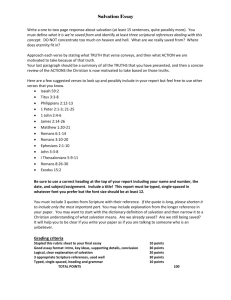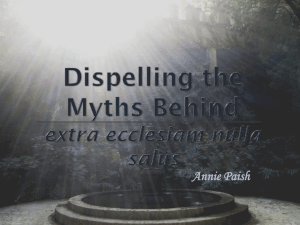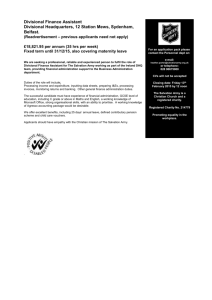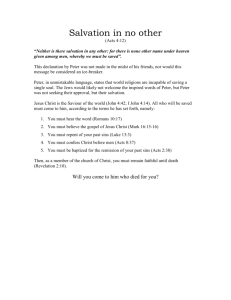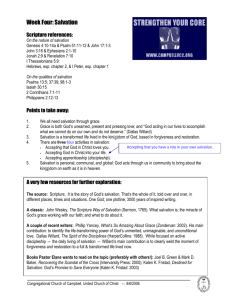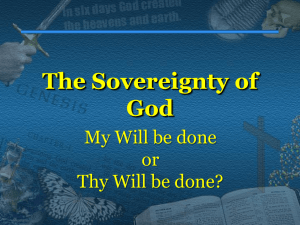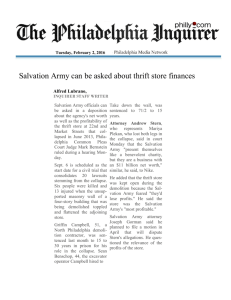Salvation Redefined - Unitarian Church in Charleston
advertisement
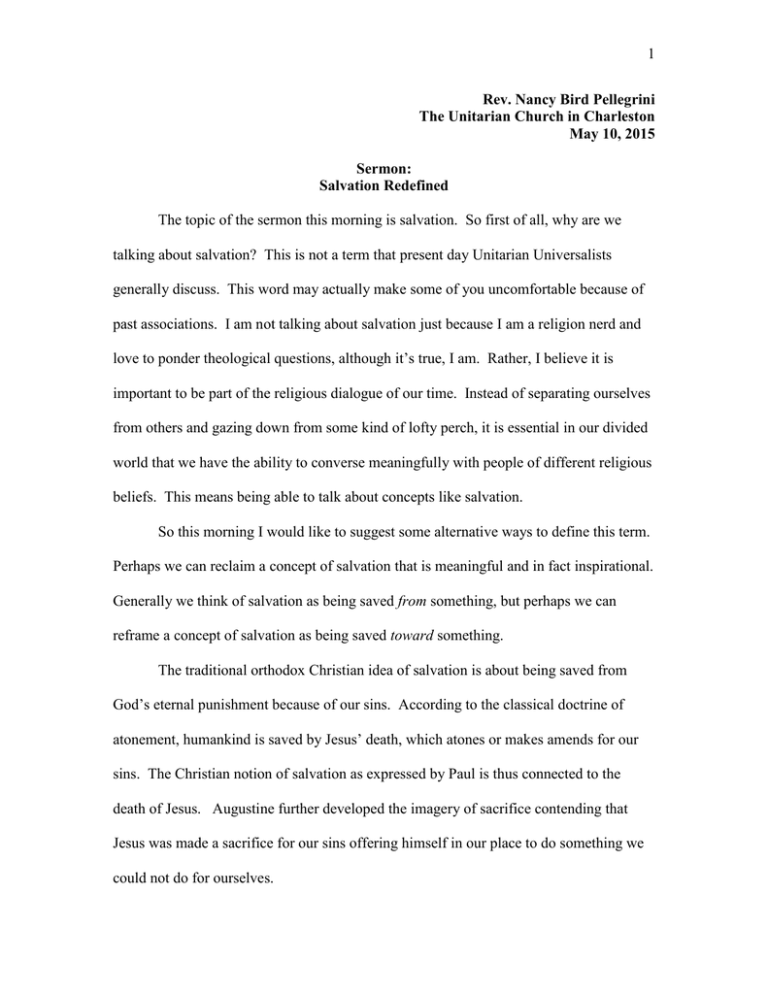
1 Rev. Nancy Bird Pellegrini The Unitarian Church in Charleston May 10, 2015 Sermon: Salvation Redefined The topic of the sermon this morning is salvation. So first of all, why are we talking about salvation? This is not a term that present day Unitarian Universalists generally discuss. This word may actually make some of you uncomfortable because of past associations. I am not talking about salvation just because I am a religion nerd and love to ponder theological questions, although it’s true, I am. Rather, I believe it is important to be part of the religious dialogue of our time. Instead of separating ourselves from others and gazing down from some kind of lofty perch, it is essential in our divided world that we have the ability to converse meaningfully with people of different religious beliefs. This means being able to talk about concepts like salvation. So this morning I would like to suggest some alternative ways to define this term. Perhaps we can reclaim a concept of salvation that is meaningful and in fact inspirational. Generally we think of salvation as being saved from something, but perhaps we can reframe a concept of salvation as being saved toward something. The traditional orthodox Christian idea of salvation is about being saved from God’s eternal punishment because of our sins. According to the classical doctrine of atonement, humankind is saved by Jesus’ death, which atones or makes amends for our sins. The Christian notion of salvation as expressed by Paul is thus connected to the death of Jesus. Augustine further developed the imagery of sacrifice contending that Jesus was made a sacrifice for our sins offering himself in our place to do something we could not do for ourselves. 2 These kinds of beliefs do work for some people and can be a positive force. Again we need to be careful not to become smug or intolerant of views different from our own. For example, for some of the patients that I see in my job as chaplain at the cancer center, the traditional Christian concept of salvation is affirming. I recently had a patient who comes from a more fundamentalist tradition ask me very sincerely and respectfully what I thought about salvation. I was awed by the fact that she was still curious and acquainting herself with different views as she neared the end of her life. I shared some of my thoughts about salvation with her and I told her that I was still formulating my ideas for a sermon on salvation that I would be giving soon. With all of that in mind, let’s delve in. It might surprise you, but actually questions of salvation have played a big role in the history of our own Unitarian Universalist faith. Taking a walk through past history can help formulate our ideas today. Although our idea of Universalism has morphed over the years into being more about universal religion and acceptance of many faith pathways, remember that the Universalist in Unitarian Universalist was originally about universal salvation within the context of Christianity. The idea was that salvation was universal, open to all people based on the unconditional love of God. One of the most influential thinkers on this subject was 19th century Universalist minister Hosea Ballou. When I was living up in New England during my chaplaincy training several years ago, I had the honor of guest preaching at the First Universalist Society of Hartland Vermont. It was a tiny beautiful New England church up in the mountains and around the bends that was a bit difficult to get to in the snow. Hosea 3 Ballou preached at this church among others as a circuit-riding minister serving Universalist “Sister Societies” from 1803 to 1809. In 1805, Ballou wrote his Treastise on Atonement, ent. It is often called the most significant work in the history of American Universalism. In it Ballou addressed the traditional Christian concept of vicarious atonement. He stated, “The belief that the Great Jevohah was offended with his creatures to that degree, that nothing but the death of Christ, or the endless misery of mankind, could appease his anger, is an idea that has done more injury to the Christian religion than the writings of all its opposers, for many centuries.”1 Ballou’s brand of religion was in stark contrast to the Calvinist beliefs of his day that spoke of the total depravity of humankind, the death of Jesus as atonement for our sins, and salvation as only available to the few who were among the elect. While Calvinism was based on fear of God’s retribution, Universalism contended that God’s love for all provided salvation for all. Humans were compelled to behave morally not out of fear but out of belief in a loving God. Ballou turned the traditional concept of atonement on its head. He painted the picture of a loving God who wanted happiness for all God’s children. Ballou argued that rather than God needing to reconcile with humans, humans needed to reconcile with God. Jesus exemplified how humans should love God. It was Jesus’ life that had atoning power not his death. As summarized by Unitarian Universalist historian David Robinson, Ballou conceived of atonement as essentially moral and salvation as character formation.2 1 Hosea Ballou, A Treatise on Atonement, Reprint of 1882 edition, http://www.danielharper.org/treatise.htm. 2 David Robinson, The Unitarians and the Universalists (Westport, CT, Greenwood Press, 1985), 65. 4 For early Universalists achieving salvation had to do with living your life in a loving way. Moving along in Unitarian Universalist history to the 20th century, humanist thinkers in the early 1900s also tackled the question of salvation. They picked up on the idea of salvation as character formation, but took God out of the equation. They believed that humans are fully accountable for their actions and have the capability and responsibility for self-improvement. Our own church member and scholar Dr. Mason Olds has written extensively about American humanists, including the father of American Humanism, John Dietrich. Quoting Dietrich’s views on salvation Dr. Olds writes, To Dietrich being saved meant ‘to fulfill the best that is in us and not the worst; to climb slowly to the highest and not fall swiftly to the lowest; to rise up and up and ever up from the unworthy things of the past toward the ideal of the perfect, perfect justice, and perfect good will.”3 Dietrich emphasized salvation, not just as being individual, but as communal. Dr. Olds writes, Dietrich’s concept of the “solidarity of humanity” signified that “it is impossible to be concerned only with individual salvation, because the health of the individual is bound up with the health of the whole fabric of humanity. Humanity is saved or lost together.”4 To Dietrich and the humanists, the key to achieving salvation was through education. This meant developing one’s capabilities to one’s full potential in this life and in this way creating social conditions for a more humane and caring society.5 For the 3 Mason Olds, American Religious Humanism (Hamden, CT: HUUmanists Association NFP, 2006), 80. 4 Ibid., 81. William R. Murry, Reason and Reverence: Religious Humanism for the 21st Century (Boston, MA: Skinner House Books, 2006), 91. 5 5 humanists self-improvement allowing for self-giving was essential for achieving salvation for the world.6 Moving along in our exploration of salvation in Unitarian Universalist thought to the 21st century, we now turn to present day Unitarian Universalist theologian Rebecca Parker. She has examined the concept of salvation particularly from a feminist point of view. Parker points out the danger especially to women and children that can result from taking the classic doctrine of atonement to its extreme in such a way that it sanctions violence and blesses suffering. She emphasizes that self-sacrifice has unequal benefits in our society such that those on the lower rungs are exploited to benefit those in power in our social structures.7 Parker contends that the concept of Jesus’ atoning death can be viewed as a kind of divine child abuse. These warnings about the potential for religion to be twisted to sanction the abuse of women and children are particularly salient on Mother’s Day. According to the recent series in the Charleston Post and Courier, in our own state of South Carolina more than 300 women have died in the last decade as a result of domestic abuse at the rate of one every 12 days. Nationwide, an average of three women are killed by a current or former lover every day.8 The Post and Courier quotes Rev. Mark Bagwell of Golden Corner Baptist church in Walhalla, SC about how religious vows and teachings have likely kept a good number of women from leaving their abusers. He said that women often feel that “God would be disappointed in them if they left their husband.”9 6 Ibid., 140. John A. Buehrens and Rebecca Ann Parker, A House for Hope: The Promise of Progressive Religion for the Twenty-First Century (Boston, Mass: Beacon Press, 2010), 68 . 8 Doug Pardue, Glenn Smith, Jennifer Berry Hawes and Natalie Caula Hauff, “Till Death Do Us Part,” The Post and Courier, (Charleston, August 2015). 9 Ibid. 7 6 Rebecca Parker looks at an alternative concept of salvation that does not involve violence and suffering. Parker views salvation as coming through powers of life and goodness in and around us.10 She sees salvation not just as heavenly reward or earthly success but the “gift of full aliveness.”11 She defines this as, “here and now, the restored and enlivened capacity to be in the world with wisdom.” She also views salvation as communal, not just “something one possesses individually; it is something one participates in communally, including in communion with those who have come before.”12 Today we especially think of the communion of saints that includes our mothers or those who have parented us. Rebecca Parker writes that her grandmother defined being saved as follows, “We are saved by every person in every time and place that has stood up for what is true in spite of threat. Like Socrates did. Like Jesus did. Like many others have done.’ We are saved by the communion of saints. They shelter us, and we have the opportunity to be in their number, here and now.”13 Salvation is an activity, as described by womanist theologian Monica Coleman. It is something you do in order to bring about social transformation.14 For oppressed peoples, salvation requires “making a way out of no way.” So where does this leave us? I believe that we can build on our ideas about salvation from all these different phases of Unitarian Universalist history. From the 19th century Universalists we can take the idea of salvation as character formation as achieved through living in a loving and accepting way. From the early 20th century humanists we 10 Parker, 63. Ibid., 74. 12 Ibid., 75. 13 Ibid. 14 Monica A. Coleman, Making a Way Out of No Way: A Womanist Theology. (Minneapolis: Fortress Press, 2008, 59. 11 7 can take the notion of developing our capabilities to our full potential in this life in order to create conditions for a more humane and caring society. From contemporary feminist thinkers we can embrace the idea of salvation as full aliveness appreciating the communion of saints that have gone before us. This is how rather than being saved from something we might be saved toward something. I would challenge you to think of what salvation means for you. How are you taking part in the activity of salvation? Maybe start with what is saving for you. I can think of many things—there are the bright young faces of the children in our church as they gather for the story for all ages and the excitement in their eyes that will no doubt come as they pass out flowers for our flower communion today. There’s the inspiration of the glowing pink skies over the rivers here in Charleston at sunset or the clear moon-bright nights over the city. There’s the miraculous mass of people of all faiths in the Charleston Area Justice Ministry who gathered last month to demand justice from our local government leaders at the Nehemiah Action meeting. I could go on and on. So I invite you to think about what is saving for you. Then think about defining salvation as something you make happen. Ask yourself how you can ignite that sacred spark that is inside you to bring salvation to our world. How can you answer the call toward a vision of the common good? Consider how you will do salvation as an activity in the here and now. In the words of Monica Coleman, “The responsibility lies with all of us. At times it is challenging but it is not without moments of joy, love, and dance. Salvation is found as we participate in teaching and healing communities that promote the social transformation of the world.”15 May it be so. 15 Coleman, 167. 8
